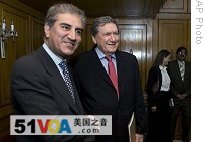Islamabad
10 February 2009
U.S. special envoy for Pakistan and Afghanistan Richard Holbrooke has held talks with Pakistani leaders on a range of security issues seeking new ways to tackle rising threat of extremism and to uproot al-Qaida led terrorist bases in the region.
 |
| U.S. Special Representative to Pakistan and Afghanistan Richard Holbrooke shakes hands with Pakistani Foreign Minister Shah Mahmood Qureshi, left, Islamabad 10 Feb. 2009 |
Their talks primarily focused on how to find new ways to stem the rising threat of terrorism, particularly in the tribal regions of Pakistan near the Afghan border.
Speaking to reporters after his meeting with the top U.S diplomat, Foreign Minister Shah Mehmood Qureshi described Holbrooke's visit as a "fact-finding" mission.
Qureshi says that he along with Holbrooke have agreed to set up and lead a joint team to discuss policy options for countering terrorism and militancy both in Pakistan and in neighboring Afghanistan.
"This team will sit down and review all the policies and design the new strategy because they feel that for any futuristic strategy, which is effective in Afghanistan, it cannot be done in isolation Pakistan has to be on board," Qureshi said.
Qureshi described the visit of envoy Holbrooke as a "new beginning" in bilateral ties but he urged the United States to rethink the policy of U.S. drone attacks against militant bases on the Pakistani side of the border.
"There are some who feel in the U.S. that they have tactical advantage in doing that and they have had some successes and high-value targets have been taken out through these attacks," Qureshi said. "But there are disadvantages as well and I shared this with him this morning that we also have to have red lines on what is acceptable and what is not acceptable to the U.S., and what is acceptable and what is not acceptable to Pakistan."
Pakistan maintains that civilian casualties in drone attacks have fueled anti-American sentiment and have increased support for extremists in the country.
U.S. envoy Holbrooke also plans to travel to Afghanistan and India later this week. U.S officials say that his visit is aimed at gathering information to help form the basis of future American policy in the region.
While appointing Holbrooke as his special envoy for the troubled region, U.S. President Barack Obama has said that Afghanistan is one of his top foreign policy objectives and has vowed to discourage terrorist bases in border regions of Pakistan to make sure neither country is again used as a base for global terrorist attacks.